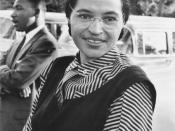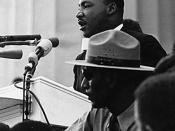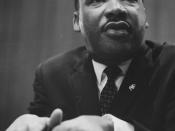The pressure of racial segregation was reaching a boiling point in 1963 in Birmingham, Alabama. After being arrested for his part in the Birmingham Campaign, Dr. Martin Luther King Jr. wrote an open letter in response to "A Call for Unity", written by eight white clergymen from Birmingham. King's "Letter from Birmingham Jail" is a true call for unity, as he clearly states and points out facts that the clergymen have omitted from their letter. King is clearly not looking to stoke the fire of segregation, he was merely looking to solve the situation at hand and trying to peacefully end racial segregation in the United States.
"A Call for Unity", written in early April 1963 by eight white clergymen from Birmingham, Alabama, clearly states eight arguments. The first argument comes almost immediately. After admitting that there is racial instability in Alabama, the clergymen express that they feel the problems should be dealt with by the courts, and that the "decisions of the courts should in the meantime be peacefully obeyed" (165).
King responds to the clergymen with the following statement: "Negroes have been experienced grossly unjust treatment in the courts" (169). The treatment of blacks was not the same as whites in the Alabama courts. Often blacks were treated harshly and unjustly. So any decisions that the courts had previously made were unjust and it would be outrageous for anyone to follow.
The second argument that the clergymen make is that they are handling the situation, "responsible citizens have undertaken to work on various problems which cause racial friction and unrest"(165). If this were to be true then, few people in Alabama at this time could be classified as "responsible." King addresses this argument in paragraph five, saying that the clergymen are not handling the situation saying, "your statement,


